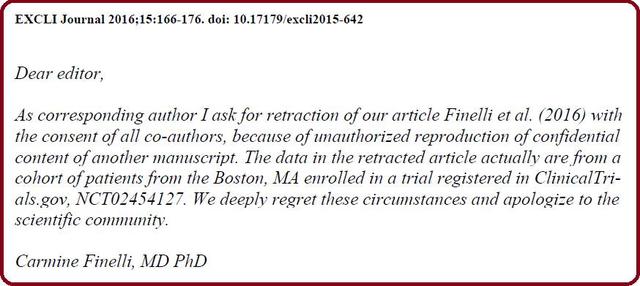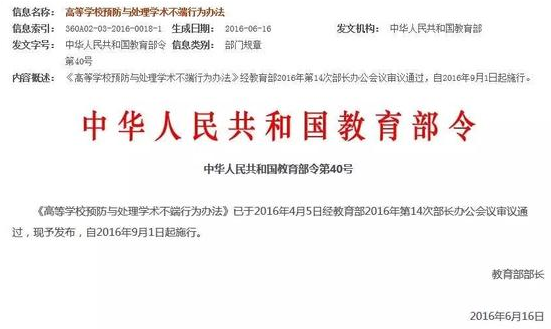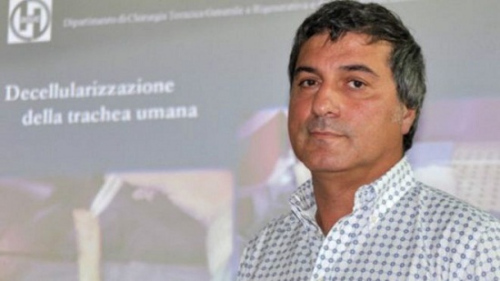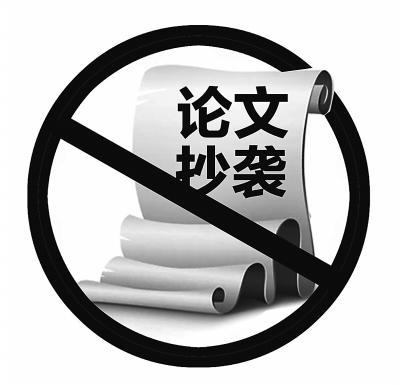学术不端之痛:审稿人恶性窃取稿件擅自发表!
2016-12-14 知社学术圈 知社学术圈
12月13日,美国期刊《内科学年鉴》(Annals of Internal Medicine)同时刊出两篇文章,直指近期发生的恶性论文剽窃事件。令人惊讶的是,抄袭并发表论文者竟是该刊的审稿人,所抄内容正是早些时候被审查的稿件。原作者直言不讳地发表了至剽窃者的信函,期刊也发表社论表明了立场。在科研领域,抄袭、剽窃等高智商盗窃行为显得比日常生活中更为常见。由于法律制度的不完善,此类行径可能难以得到
12月13日,美国期刊《内科学年鉴》(Annals of Internal Medicine)同时刊出两篇文章,直指近期发生的恶性论文剽窃事件。令人惊讶的是,抄袭并发表论文者竟是该刊的审稿人,所抄内容正是早些时候被审查的稿件。原作者直言不讳地发表了至剽窃者的信函,期刊也发表社论表明了立场。
在科研领域,抄袭、剽窃等高智商盗窃行为显得比日常生活中更为常见。由于法律制度的不完善,此类行径可能难以得到应有的制裁。不过,正义的声音总会呐喊出来,《内科学年鉴》就最近一起极为恶劣的审稿人剽窃行为做出了官方回应,希望这不仅能够让读者明白事件的严重性,同时以儆效尤,杜绝此类行为的发生。
Michael L. Dansinger, MD, MS
Tufts University School of Medicine
时隔一年,2016年8月,Dansinger突然发现了令人震惊的情况。今年2月23日发表在EXCLI Journal上的一篇文章几乎和他们此前递交给《内科学年鉴》的稿件如出一辙。他很快意识到,这很可能是《年鉴》的审稿人剽窃了他们的稿件内容,擅自发表。于是他很快联系了期刊编辑。
EXCLI Journal 上的涉事论文
经确认,EXCLI Journal上该文章的一名意大利作者确实曾为《年鉴》审稿。《年鉴》联系了其本人,他对此供认不讳。EXCLI Journal也同时获悉此事,于2016年9月将该文撤稿。
按照通用的学术不端处理建议,《年鉴》联系了涉事人在文章所列机构的领导。该机构承认知悉了此事,但并未就如何处理做进一步说明。
事发后涉事者的撤稿函
从《内科学年鉴》的社论来看,这一事件在多个层面暴露了严重的问题。
首先,负责同行评议的审稿人应确保稿件的机密性。在文章正式发布并可以作为信息源引用之前,他们应避免在审稿过程中获取稿件内容以供自己使用。
第二,该审稿人明目张胆地窃取了他人成果,并几乎原封不动地抄袭了文字、表格和图示。
第三,该审稿人编造了一组并不存在的欧洲病患,这是极为恶劣的行为,可能会导致其他人参考这些伪造数据并做出临床决定。
第四,这篇剽窃文章拥有多位共同作者。这些作者同样应当受到谴责。他们列上了自己的姓名,但显然没有做出任何科研贡献,甚至没有对该研究是否真实存在做过验证。
《年鉴》编辑部对此也深感困扰,他们选择并信任的审稿人竟然会做出如此道德败坏之事。尽管以往没有经历过类似的事件,但期刊对此事的态度还是非常明确。
与此同时,受害人Dansinger博士也以“Plagiarist”为抬头,写了一封富含激情的公开信,痛斥这样的学术不端。他指出,这一行为对双方都带来了伤害。这一成果基于他们先前的工作,从概念雏形到论文形成历时5年,相当于4000个小时的工作量。被抄袭的分析方法也是其同事花费多年才建立起来的。而受到伤害的不仅是双方人员,还包括抄袭者的机构、学者对同行评议过程的信任,以及公众对医学研究的信任。
字里行间,我们可以感受到文字背后的愤怒。不过Dansinger博士也做到了理性处置,他希望将这一事件公开,为科研群体树立正确的价值观,也希望抄袭者能够改邪归正,将来为学术界带来积极的影响。
下附Dansinger博士公开信全文:
Dear Plagiarist: A Letter to a Peer Reviewer Who Stole and Published Our Manuscript as His Own
Dr. Doctor,
I am aware that you recently admitted to wrongly publishing, as your own, a scientific research paper that I had submitted to Annals of Internal Medicine. After serving as an external peer reviewer on our manuscript, you published that same manuscript in a different medical journal a few months later. You removed the names of the authors and the research site, replacing them with the names of your coauthors and your institution.
It took 5 years from conceptualization of the study to publication of the primary analysis. This study was my fellowship project and required a lot of work. It took effort to find the right research team, design the study, raise the funds, get approvals, recruit and create materials for study participants, run the diet classes, conduct the study visits, compile and analyze the study data, and write the initial report. The work was funded by the U.S. government and my academic institution. The secondary analysis that you reviewed for Annals used specialized methods that took my colleagues many years to develop and validate. In all, this body of research represents at least 4000 hours of work. When you published our work as your own, you were falsely claiming credit for all of this work and for the expertise gained by doing it.
As you must certainly know, stealing is wrong. It is especially problematic in scientific research. The peer-review process depends on the ethical behavior of reviewers. Physicians and patients depend on the integrity of the process. Such cases of theft, scientific fraud, and plagiarism cannot be tolerated because they are harmful and unethical. Those who engage in such behavior can typically expect their professional careers to be ruined: Loss of reputation, loss of employment, and ineligibility for future research funding are the norm. Coauthors are also collaborators in the fraud, and such losses potentially apply to them as well. All the previous publications of those who steal others' work become suspect, and it reflects poorly on their training institutions, current employers, collaborators, and mentors.
It is hard to understand why you would risk so much. You have no doubt worked hard to become a physician and scientist. I know that you have published many research papers. It just doesn't make sense. Whether the pressure to publish is so intense, or whether the culture where you work is relatively permissive such that plagiarism is not taken as seriously, or whether getting caught seemed unlikely—it is hard to imagine why you would take this chance.
I hope you will not steal anyone else's research in the future. Instead, perhaps there is some way you can assist the scientific community's efforts to reverse the growing epidemic of plagiarism and scientific fraud. Helping to raise awareness of the problem and identifying potential solutions would be positive steps in the right direction.
原始出处:
本网站所有内容来源注明为“梅斯医学”或“MedSci原创”的文字、图片和音视频资料,版权均属于梅斯医学所有。非经授权,任何媒体、网站或个人不得转载,授权转载时须注明来源为“梅斯医学”。其它来源的文章系转载文章,或“梅斯号”自媒体发布的文章,仅系出于传递更多信息之目的,本站仅负责审核内容合规,其内容不代表本站立场,本站不负责内容的准确性和版权。如果存在侵权、或不希望被转载的媒体或个人可与我们联系,我们将立即进行删除处理。
在此留言













#审稿#
64
#学术不端#
47
一旦剽窃,永久封杀。
93
害群之马,哪儿都有啊!学术界也不清净!
95
这个期刊很负责充满正能量
84
我就被窃过。擦了真是醉了。
77
这种人胆子也太大了点
80
真是奇葩
41
学术界的不正之风大到超乎意料,未来要发论文的我不免心生恐慌
45
这都可以,可以赶出学术圈吗
44